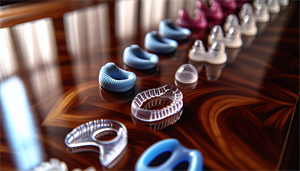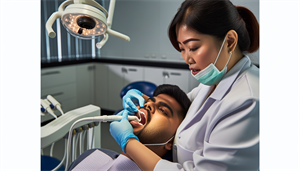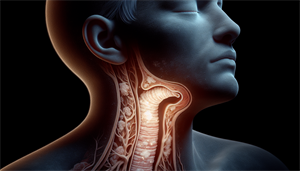What Is a Mouthpiece?
Ever wondered, “what is a mouthpiece?” It’s the small device musicians place in their mouths when playing a wind instrument, or the one boxers use to protect their teeth during a match. These devices, known as mouthpieces, serve a variety of purposes beyond the world of music and sports. From medical to dental applications, their usage is wide and varied.
Key Takeaways
-
Mouthpieces are versatile tools serving various functions including facilitating airflow to prevent snoring, protecting teeth from grinding, and ensuring open airways in sleep-related breathing disorders.
-
Mouthpieces are essential in both medical and athletic applications, providing benefits such as reducing the severity of sleep apnea, protecting teeth during sports, and preventing brain injuries by absorbing shock.
-
Choosing the right mouthpiece is integral to performance in both music and sports, with factors such as sound, compatibility, and protection needs guiding the selection process.
Exploring the Various Functions of a Mouthpiece

The mouthpiece, though small, plays a significant role in facilitating a variety of functions. Much like a wind instrument, it requires an open airway for proper functioning. Anti-snoring devices and teeth grinding prevention both rely on the mouthpiece as a vital tool to ensure uninterrupted air flow and provide protection.
Mouthpiece functionality extends far beyond merely keeping an open airway. They also act as a protective shield for the upper and lower teeth during grinding, similar to how a pipe protects its contents from external damage. The diverse functions of a mouthpiece are indeed an answer to a variety of oral health challenges.
Anti-Snoring Devices
For those who struggle with snoring, an anti-snoring mouthpiece could be a game-changer. Its primary function is to expand the airway during sleep, thereby preventing snoring. In a manner similar to posture adjustment for comfort, these devices reposition the jaw and tongue to maintain a comfortable, open airway all night.
The effectiveness of these devices speaks volumes. Clinically proven to reduce snoring, they reposition the jaw and tongue to provide an unobstructed airway, much like how a pipe facilitates the smooth flow of water. This mechanism enhances sleep quality and reduces disturbances, providing a respite to those grappling with snoring.
Teeth Grinding
Teeth grinding, medically referred to as bruxism, is a common issue triggered by various factors such as stress, anxiety, or irregular bite. Much like a government regulating a nation, this involuntary grinding is controlled by the masticatory muscles and the trigeminal nerve.
Not using a mouthpiece can result in numerous issues, including tooth fractures, headaches, and jaw disorders. Hence, mouthpieces, typically crafted from materials like ethylene-vinyl acetate (EVA), acrylic, and silicone, act as a protective barrier and play a crucial role in preventing damage caused by grinding.
Tongue Stabilizing Devices
Tongue stabilizing devices, though less known, play a significant role in managing sleep-related breathing issues. Comparable to a lawyer or an attorney maintaining a client’s best interests, these devices are designed to keep the tongue in a stable position during sleep, thereby enhancing breathing.
These devices function by being inserted into the mouth before sleep, effectively maintaining the tongue in a forward position, akin to a trumpet player positioning their mouth and tongue to produce the desired sound. Scientific studies have highlighted the effectiveness of these devices in managing sleep apnea, despite some minor side effects like mouth dryness and heightened saliva production.
The Role of a Mouthpiece
Mouthpieces are instrumental in addressing sleep breathing disorders. Their use can lead to:
-
A significant reduction in breathing difficulties
-
Alleviation of snoring
-
Reduction in sleep apnea severity
-
Mitigation of daytime sleepiness.
These devices are predominantly utilized for managing prevalent sleep breathing disorders such as obstructive sleep apnea (OSA). By adjusting the position of the lower jaw, they enhance airflow during sleep, much like how a newspaper platform facilitates diverse opinions.
Sleep Breathing Disorders
Sleep breathing disorders, such as chronic snoring, sleep apnea, and breathing-related sleep disorder, can significantly impact the quality of life. By maintaining an open airway and enhancing airflow during sleep, mouthpieces are vital in managing these conditions.
Empirical studies have demonstrated the efficacy of mouthpieces in mitigating breathing interruptions during sleep, enhancing daytime alertness, and decreasing snoring. Despite not being as effective as continuous positive airway pressure (CPAP) for sleep apnea, they offer substantial benefits for mild to moderate cases, acting as an effective solution.
Etymology and History of the Term "Mouthpiece"
The term ‘mouthpiece’ has evolved over the years to include:
-
Something placed in or constituting a mouth
-
The part of a musical instrument inserted into the mouth
-
A metaphorical sense denoting an individual or entity articulating the viewpoints of a group or organization
Types of Mouthpieces and Their Applications

Mouthpieces are versatile, meeting a wide range of needs. From sports protection to sleep apnea management, they play a crucial role in various scenarios.
In the dental realm, there are different types of mouthpieces designed for different purposes:
-
Boil-and-Bite Mouthguards: These are designed for sports.
-
Soft Mouthguards: These cater to bruxism.
-
Custom-made, Boil and bite, and Stock mouthguards: These are sports mouthguards that prevent injuries during sports engagements.
Medical and Dental Mouthpieces
Medical and dental mouthpieces have a broad range of uses. For sleep apnea, they alter the jaw or tongue position to increase the throat’s airway space, effectively enhancing airflow during sleep.
This device offers several advantages:
-
It decreases breathing pauses and enhances blood oxygen levels
-
It serves as an alternative to CPAP machines
-
It provides additional dental benefits
-
It is easily removable, making it a convenient option.
Sports Mouthguards

Mouthguards are essential in the realm of sports. They:
-
Safeguard against teeth damage
-
Avert tooth loss
-
Reduce the risk of brain injuries by absorbing shock
-
Provide a secure and stable fit, potentially playing a role in preventing and reducing concussions.
Mouthguards are crucial in high contact sports like football, lacrosse, and boxing, where the risk of injury is high. Crafted from materials like ethylene-vinyl acetate (EVA) and latex rubber, these mouthguards offer flexibility, shock absorbency, and durability, essential in protecting the mouth during sports activities.
How to Choose the Right Mouthpiece
The selection of the right mouthpiece is a crucial task that depends on various factors. These include:
-
Sound
-
Instrument compatibility
-
Playing style
-
Personal preference
Much like selecting the perfect outfit from a collection of articles, finding the right mouthpiece can significantly enhance the overall experience in the company of fellow enthusiasts and even silence the critics.
The material of the mouthpiece is another significant factor to consider during selection. While brass is widely used due to its workability and acoustic properties, experimenting with various materials can help find the most suitable match for an individual’s playing style and preferences. A well-fitting mouthpiece should facilitate unrestricted breathing and speech without requiring jaw adjustments or clenching.
Summary
In this exploration of mouthpieces, we’ve journeyed through the varied functions, roles, and types of these versatile devices. From managing sleep disorders to preventing sports injuries and teeth grinding, the mouthpiece serves as a protective and therapeutic tool in various realms.
The choice of the right mouthpiece is crucial and should be done based on one’s specific needs and preferences. By understanding the value and impact of mouthpieces, we can harness their potential to enhance our health and well-being, much like how a well-informed citizen can contribute positively to society.
Frequently Asked Questions
What is mouthpiece mean in slang?
In slang, "mouthpiece" refers to a person who acts as a puppet, expressing exactly what another person wants, or it can also refer to a criminal lawyer. It is often used to describe lawyers, especially criminal defense lawyers.
What is a mouthpiece in writing?
A mouthpiece in writing refers to a person, newspaper, or other entity that conveys the opinions or sentiments of others. It can also be a spokesperson or interpreter of another's views.
What does act as a mouthpiece mean?
Being a mouthpiece means that you inform others about the opinions and policies of an organization or individual. For example, the vice president acts as their mouthpiece.
What is a mouthpiece in politics?
A mouthpiece in politics refers to a person, newspaper, or organization that represents and expresses the views of another individual or group. It can be the official spokesperson for the government or an opposition party.
How do anti-snoring mouthpieces work?
Anti-snoring mouthpieces work by repositioning the jaw and tongue to maintain an open airway, effectively preventing snoring.


